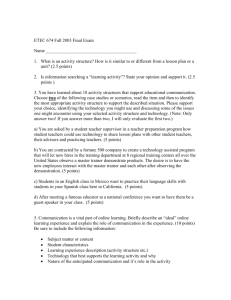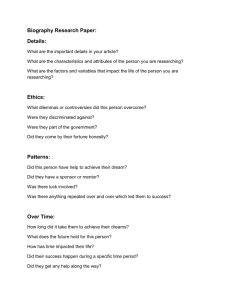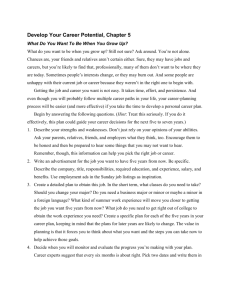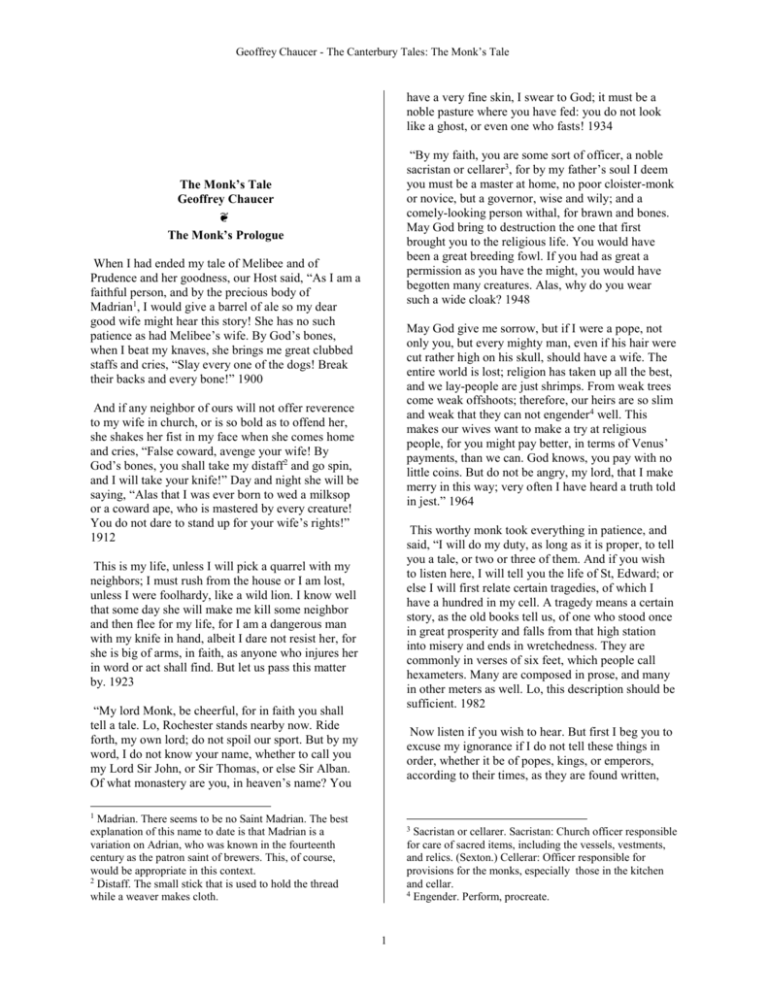
Geoffrey Chaucer - The Canterbury Tales: The Monk’s Tale
have a very fine skin, I swear to God; it must be a
noble pasture where you have fed: you do not look
like a ghost, or even one who fasts! 1934
“By my faith, you are some sort of officer, a noble
sacristan or cellarer3, for by my father’s soul I deem
you must be a master at home, no poor cloister-monk
or novice, but a governor, wise and wily; and a
comely-looking person withal, for brawn and bones.
May God bring to destruction the one that first
brought you to the religious life. You would have
been a great breeding fowl. If you had as great a
permission as you have the might, you would have
begotten many creatures. Alas, why do you wear
such a wide cloak? 1948
The Monk’s Tale
Geoffrey Chaucer
❦
The Monk’s Prologue
When I had ended my tale of Melibee and of
Prudence and her goodness, our Host said, “As I am a
faithful person, and by the precious body of
Madrian1, I would give a barrel of ale so my dear
good wife might hear this story! She has no such
patience as had Melibee’s wife. By God’s bones,
when I beat my knaves, she brings me great clubbed
staffs and cries, “Slay every one of the dogs! Break
their backs and every bone!” 1900
May God give me sorrow, but if I were a pope, not
only you, but every mighty man, even if his hair were
cut rather high on his skull, should have a wife. The
entire world is lost; religion has taken up all the best,
and we lay-people are just shrimps. From weak trees
come weak offshoots; therefore, our heirs are so slim
and weak that they can not engender 4 well. This
makes our wives want to make a try at religious
people, for you might pay better, in terms of Venus’
payments, than we can. God knows, you pay with no
little coins. But do not be angry, my lord, that I make
merry in this way; very often I have heard a truth told
in jest.” 1964
And if any neighbor of ours will not offer reverence
to my wife in church, or is so bold as to offend her,
she shakes her fist in my face when she comes home
and cries, “False coward, avenge your wife! By
God’s bones, you shall take my distaff2 and go spin,
and I will take your knife!” Day and night she will be
saying, “Alas that I was ever born to wed a milksop
or a coward ape, who is mastered by every creature!
You do not dare to stand up for your wife’s rights!”
1912
This worthy monk took everything in patience, and
said, “I will do my duty, as long as it is proper, to tell
you a tale, or two or three of them. And if you wish
to listen here, I will tell you the life of St, Edward; or
else I will first relate certain tragedies, of which I
have a hundred in my cell. A tragedy means a certain
story, as the old books tell us, of one who stood once
in great prosperity and falls from that high station
into misery and ends in wretchedness. They are
commonly in verses of six feet, which people call
hexameters. Many are composed in prose, and many
in other meters as well. Lo, this description should be
sufficient. 1982
This is my life, unless I will pick a quarrel with my
neighbors; I must rush from the house or I am lost,
unless I were foolhardy, like a wild lion. I know well
that some day she will make me kill some neighbor
and then flee for my life, for I am a dangerous man
with my knife in hand, albeit I dare not resist her, for
she is big of arms, in faith, as anyone who injures her
in word or act shall find. But let us pass this matter
by. 1923
“My lord Monk, be cheerful, for in faith you shall
tell a tale. Lo, Rochester stands nearby now. Ride
forth, my own lord; do not spoil our sport. But by my
word, I do not know your name, whether to call you
my Lord Sir John, or Sir Thomas, or else Sir Alban.
Of what monastery are you, in heaven’s name? You
Now listen if you wish to hear. But first I beg you to
excuse my ignorance if I do not tell these things in
order, whether it be of popes, kings, or emperors,
according to their times, as they are found written,
1
Madrian. There seems to be no Saint Madrian. The best
explanation of this name to date is that Madrian is a
variation on Adrian, who was known in the fourteenth
century as the patron saint of brewers. This, of course,
would be appropriate in this context.
2 Distaff. The small stick that is used to hold the thread
while a weaver makes cloth.
3
Sacristan or cellarer. Sacristan: Church officer responsible
for care of sacred items, including the vessels, vestments,
and relics. (Sexton.) Cellerar: Officer responsible for
provisions for the monks, especially those in the kitchen
and cellar.
4 Engender. Perform, procreate.
1
Geoffrey Chaucer - The Canterbury Tales: The Monk’s Tale
but put some before and some behind, as they come
now into my memory.” 1990
men with no weapon but an ass’s cheek-bone. When
they were slain, he was so athirst that he nearly
perished; and prayed to God to pity his pains and
send him drink, or else he must die. From a molartooth in the ass’s dry jaw-bone there rushed then a
spring, from which he drank his fill. Thus God helped
him, as the Book of Judges tells. 2046
Explicit.
Here begins the Monk’s Tale
De Casibus Virorum Illustrium5
In the manner of tragedy I will bewail the misfortune
of them that stood in high estate and so fell that no
remedy could bring them out of their adversity. For
when Fortune will flee, none can detain the course of
her. Let no man trust in blind good fortune; be
warned by these old and true examples. 1998
At Gaza one night by sheer force, in spite of the
Philistines in that city, he tore up the gates of the
town and carried them on his back high upon a hill
for all to see. O noble almighty Sampson, prized and
dear, had you not told your secret to women, there
would have been nowhere your match in this entire
world. This Sampson never took strong drink or
wine, and never did a razor or shears come upon his
head, by precept of the divine messenger, for all his
strength lay in his hair. 2058
Lucifer
At Lucifer, though he was an angel and not a man, I
will begin. For though Fortune cannot harm an angel,
yet for his sin he fell down from his high degree into
hell, where he now is. O Lucifer, brightest of all
angels, now you are Satan and can never depart from
that misery into which you are fallen. 2006
Twenty winters, year by year, he had the governance
over Israel. But soon he must weep bitterly, for
women brought him to ruin. He told his mistress
Delilah that all his strength lay in his hair, and she
falsely sold him to his enemies, and while he slept in
her lap one day, she had his hair clipped and sheared
and let his enemies detect his secret. When they
found him in this plight, they bound him fast and put
out his eyes. Before his hair was clipped or shorn no
bond could bind him, but now he was imprisoned in a
cave and made to grind at a hand-mill. 2074
Adam
Lo, Adam was created in the plain of Damascus by
God’s own finger and not uncleanly begotten of
man’s loins, and he was lord of all paradise, except
one tree. Never was a man on earth of such high
estate until he was driven, on account of sin, from his
high prosperity to labor, misfortune, and hell. 2014
O noble Sampson, strongest of men, once a judge in
glory and wealth, now may you weep with your blind
eyes, since you are fallen from happiness to
wretchedness. The end of the poor creature was this.
One day his enemies made a festival and set him to
play the fool before them. And this was in a splendid
temple. But at last he created dread ruin; for he shook
two pillars and made them fall; down fell the temple
and all, and there it lay, and it slew him and all his
enemies, every one of the princes, that is to say, with
three thousand bodies altogether. 2090
Sampson
Behold Sampson, who long before his birth was
announced by an angel and consecrated to almighty
God, and stood in high honor as long as he had his
eyes. There was never another such man as he in
terms of strength and hardiness. But he told his secret
to his wives, for which he slew himself for misery.
This noble almighty champion slew a lion and tore
him entirely to pieces with no weapon but his two
hands, as he walked on his way to his wedding. His
false wife so cajoled and entreated him until she
knew his secret and treacherously revealed it to his
foes, and forsook him and took another mate. In
wrath he took three hundred foxes, and bound their
tails together and knit a burning brand to every tail
and so set the foxes’ tails afire. 2034
I say no more of Sampson. Be warned by this old
and simple example, that men tell not their secret to
their wives if it pertains to life or limb.
Hercules
His own deeds sing laud and high renown of
Hercules, the sovereign conqueror, the flower of
strength in his time. He slew the lion and took his
skin, and laid low the Centaur’s boast. He slew the
Harpies, the dreadful cruel birds, and robbed the
dragon of his golden apples. He brought away
Cerberus the hell-hound. 2102
They burned up all the corn in that land and all their
olive-trees and vines as well. He slew a thousand
5
De Casibus Virorum Illustrium. On the fall of famous
men.
2
Geoffrey Chaucer - The Canterbury Tales: The Monk’s Tale
both young and old to bow and pay veneration, or be
burned in a furnace full of red flames. But never
would Daniel and his two young fellows consent to
that act. This king of kings, proud and arrogant,
deemed that God who sits in majesty could not
bereave him of his high station. But suddenly he lost
his dignity, and became like a beast, and ate hay like
an ox and lay under the sky and walked in the rain
with wild beasts, until a certain time arrived. 2176
He slew the cruel tyrant Busiris and gave him to his
horses to devour, flesh and bones. He slew the fiery
venomous serpent, and broke one of the two horns of
Achelous, and Cacus he slew in a rocky cave, and the
giant Antaeus, the strong, and the grisly boar, and
carried heaven upon his neck for many days. 2110
There was never a creature since the world was
made that slew so many monsters. Because of his
strength and high virtues, his name ran throughout
this wide world, and he traveled to see every realm.
He was so strong that no man could stop him. At both
ends of the world, says Trophee, he set pillars as
boundaries. 2118
His hair grew as if it were an eagle’s feathers and his
nails were like a bird’s claws, until God released him
from certain years of punishment and gave him back
his wit. And then with many tears he thanked God
and at all times in his life was in fear about doing
amiss or trespassing further, and until he was laid on
his bier he knew that God was mighty and full of
grace. 2182
This noble champion had a sweetheart, Dianira by
name, fresh as the month of May, and, as the scholars
note, she sent him a shirt, fresh and fine. Alas this
shirt, alas and alack! It was envenomed so subtly that
before he had worn it half a day, his flesh fell entirely
from his bones. 2126
Belshazzar
His son, Belshazzar, who held the throne after his
father’s day, was not able to come to understanding
by his father, for he was proud of heart and
sumptuous in his lifestyle, and at all points an
idolater. His high estate made him feel secure in his
pride. But Fortune cast him down and suddenly
divided his kingdom. 2190
But nonetheless some scholars excuse her and blame
a certain Nessus who made it. Be that as it may, I will
not accuse her; but he wore the shirt upon his naked
back until his flesh blackened with the venom. And
when he saw there was no help, he raked up for
himself a bed of hot coals, for he chose not to die
with any poison. 2134
At one time he made a festival to all his lords and
told them to be carefree; he called his officers. “Go,”
he said, “bring forth the vessels that my father, in his
prosperity took from the temple of Jerusalem, and let
us give thanks to our high gods for the honor that our
elders left with us.” His wife, his lords, and his
concubines drank out of these noble vessels various
wines as long as they wished. And this king cast his
eye upon the wall and saw an armless hand writing,
for fear of which he quaked and sighed sorely. This
hand which made Belshazzar so sorely aghast wrote,
“Mane, techel, phares” and nothing else. 2204
Thus this worthy, mighty Hercules died. Lo, who
can trust Fortune for a long time? He who follows the
ways of this crowded world is often laid low before
he is aware. Wise is he who knows himself. Beware,
for when Fortune chooses to flatter, she watches to
overthrow her man in such way as he would least
imagine. 2142
Nebuchadnezzar
The mighty throne and precious treasure, the
glorious scepter and royal majesty of King
Nebuchadnezzar can scarcely be described by tongue.
Twice he won Jerusalem, and carried off the vessels
of the temple. His sovereign seat was at Babylon, and
there he enjoyed his glory and delight. 2150
In all that land there was no magician who could
interpret these letters; but Daniel interpreted it then
and said, “King, God lent to your father glory and
honor, dominion, treasure, and revenue. And he was
proud and in no way feared God, and therefore God
sent upon him heavy vengeance and bereft him of his
kingdom. 2214
The fairest children of the royal blood of Israel he
made his eunuchs and slaves. Among others was
Daniel, the wisest child of all; for he expounded the
king’s dreams when there was no scholar in Chaldea
who knew to what end his dreams pointed. 2158
“He was cast out from the company of man, his
habitation was with asses, and he lay like a beast in
wet and dry, until he knew by grace and reason that
the God of heaven has dominion over every realm
and every creature. And then God had compassion
for him and restored to him his kingdom and his own
This proud king had a golden statue made, sixty
cubits high and seven wide, to which he commanded
3
Geoffrey Chaucer - The Canterbury Tales: The Monk’s Tale
form. Now you, his son, are proud also, and know all
these things. You are a rebel to God and are his foe.
You have drunk from his vessels boldly; and your
wife and your concubines drank sinfully various
wines from the same vessels, and cursedly you praise
false gods. Therefore great pains are decreed for you.
2230
intention to have a child, to multiply the world; and
as soon as she could tell that she was not with child
on account of that deed, then she would allow him to
perform his fantasy again, and only once, without
doubt. 2286
And if she were with child at that time, she would
play this game no more, until a full forty weeks were
past; then she would allow him to do the same once.
Regardless of whether this Odenathus were wild or
tame, he got no more of her, for thus she said: it was
lechery and shame for a woman, in any other case, if
men played with them. 2295
“This hand that wrote on the wall “Mane, techel,
phares,” was sent from God, believe me. Your reign
is over; you are of no consequence at all; your
kingdom is divided and shall be given to the Medes
and Persians.” And the same night the king was slain
and Darius occupied his station, though he had no
lawful right to it. 2238
She had two sons by this Odenathus, whom she
brought up in virtue and learning. But now let us
return to our tale. I say so worshipful a creature, so
wise indeed and liberal without prodigality, so active
and resolute in war, so courteous as well, was
nowhere to be found in this entire world. 2302
Gentle people, you may take warning by this, how
there is no security in lordship. For when Fortune
will forsake a man, she bears away kingdom, and
wealth, and friends, great and small. What friends a
man has in good fortune, mishap will make enemies.
I believe this proverb is true and well-known. 2246
Her rich array both in terms of precious vessels and
of clothes could not be described; she was clad
entirely in gems and gold. She spared nothing, even
taking into account all of her hunting, to gain full
knowledge of various languages when she had
leisure, and the study of books was all her delight,
and how she might spend her life in virtue. 2310
Zenobia
Zenobia, Queen of Palmyra, as the Persians write
concerning her glory, was so valorous and so bold in
arms that no creature passed her in hardihood, nor in
lineage or in other nobleness. 2251
And, to treat this story briefly, so valiant were she
and her husband that they conquered and held with
strong hand many great kingdoms and many fair
cities in the orient that had belonged to the majesty of
Rome. Never could their foes put them to flight while
Odenathus’ days lasted. Whoever wishes to read of
her battles against Sapor the king and others, and
how all these events were decided why she made her
conquests and what title she had in that, and
afterward of her woe and misfortune, how she was
besieged and taken, let them go to my master
Petrarch6, who writes enough of this, I believe. 2326
She was descended from the blood of Persian kings;
I do not say that she was the fairest of all women, but
her form could not be amended. From her childhood I
find that she fled to the woods from women’s duties.
With her broad arrows she spilled many wild harts’
blood; she was so swift that she seized them quickly.
2259
When she was older she would kill lions and
leopards, and tear bears to pieces and in her arms
dealt with them at will. She dared seek wild beasts’
dens and roam over the mountains all night and sleep
under a bush. Because of her true strength she could
wrestle with any young man, no matter how strong he
was. Nothing could stand against her arms. She kept
her maidenhood against every creature and chose to
be bound to none. 2270
When Odenathus died, she held the realm with her
own mighty hand and fought so fiercely against her
foes that there every king or prince in that entire
region was glad if he found such grace that she did
not make war with him. With her they made treaties
and alliances to live in peace and let her ride and
sport at will. Neither Claudius7 the emperor of Rome
At length her friends married her to Odenathus, a
prince of that country, albeit she delayed them for a
long time. (And you shall understand that he had
much the same fancies as she.) But nevertheless,
when they were knit together, they lived in joy and
felicity, for each held the other dear, except one
thing: that she would never agree, in any way, that he
should lie with her only once, for it was her full
6
Petrarch. The Italian poet and philosopher Petrarch (13041374) was not Chaucer’s source; rather it was Boccaccio
(1313-1375), who wrote De Casibus Virorum Illustrium.
7 Claudius. Claudius Gothicus, emperor of Rome 268-70
AD.
4
Geoffrey Chaucer - The Canterbury Tales: The Monk’s Tale
nor Gallienus8 before him, nor any Armenian or
Egyptian, Syrian or Arabian, was so courageous as to
dare fight with her in the field, lest she slay them
with her own hands or put them to flight with her
troops. 2342
was not a bit like Charlemagne’s Oliver13, who
always heeded fidelity and honor, but a Ganelon14 of
Armorica corrupted by a bribe, who brought this
worthy king into such a snare. 2390
On Pierre, King of Cyprus
Her two sons went in regal habit as heirs of all their
father’s realms; and Hermanno and Thymalao were
their names in Persian. But ever Fortune mingles
gall9 in her honey; this mighty queen could endure no
long time. Fortune made her fall from her kingdom
into wretchedness and misfortune. 2350
O worthy Pierre15, King of Cyprus, you who won
Alexandria by noble generalship, you brought woe to
many heathens. For this your own lieges were
envious of you, and one morning murdered you in
your bed, for nothing but your knighthood. Thus
Fortune rules and guides her wheel, and brings man
from joy to sorrow. 2398
Aurelian, when the governance of Rome came into
his hands, planned vengeance upon this queen, and
took his way with his legions toward her land; and, to
tell it shortly, made her flee, and at last seized and
bound her in fetters with her two children, and won
the land and went back to Rome. Among other things
that he won, this Aurelian, the great Roman, took
with him her chariot all wrought with gold and gems,
so that all might see it. Zenobia walked before his
triumphal chariot with golden chains hanging from
her neck, crowned according to her station, and her
habit loaded with gems. Alas, Fortune! The whole
rabble gawked at her who was once dreadful to kings
and emperors. Alas! She that was helmeted in steel in
stern onslaughts, and defeated mighty towns and
towers by force, shall now, as it were, have a helmet
of glass upon her head. She who bore a splendid
scepter shall, in turn, bear a distaff. 2374
On Barnabas of Lombardy
Great Bernabo Visconti of Milan, the god of
pleasure and scourge of Lombardy, since you
climbed to such high estate, why should I not recount
your ill fortune? Your brother’s son, allied to you
doubly, both nephew and son-in-law, caused you to
die in his prison. But why or how you were slain I
know not.
On Ugolino, Count of Pisa
No tongue, for pity, can tell of the languishing of
Earl Ugolino of Pisa16. But a little out of Pisa stands a
tower in which he was imprisoned with his three little
children, the eldest scarcely five years old. Alas! It
was great cruelty to put such birds in such a cage!
2414
On Pedro, King of Spain
O noble worthy Pedro10, Spain’s glory, whose
majesty Fortune held so high, in truth all ought to
mourn your piteous death. Your brother made you
flee your own land, and afterwards in a siege through
deception you were betrayed and led to his tent and
there slain by his own hand; and he succeeded to
your kingdom and revenues. 2382
In that prison he was forced to die, for Ruggieri 17,
Bishop of Pisa, had made on him a false accusation,
wherefore the people rose against him and put him in
prison, in such fashion as you have heard; and of
meat and drink he had so little that it could scarcely
suffice, and what little he had was poor and bad
indeed. One day it happened that at the hour when his
meal was usually brought, the jailer shut the towerdoors. 2425
He who bore11 the coat of arms with the field of
snow and a black eagle in it, caught by a lime-twig of
bright red, brewed all this sin and cursedness; and the
Wicked Nest12 was a worker of this extremity. He
Armorican knight, is not to be confused with the Oliver
mentioned below.
13 Oliver. Faithful retainer to Charlemagne and friend of
Roland, both of whom defend the rear guard to the end in
the French epic The Song of Roland.
14 Ganelon. The traitor who caused the death of thousands
of French troops, as described in The Song of Roland.
15 Pierre. Pierre de Lusignan.
16 Ugolino of Pisa. The most famous re-telling of this story
is from Ugolino’s own mouth in Canto 33 of Dante’s
Inferno.
17 Ruggieri. Ruggieri degli Ubaldini.
8
Gallienus. emperor of Rome 253-68 AD.
Gall. Anything bitter.
10 Pedro. Pedro of Castile.
11 He who bore. Bertrand du Guesclin is the villain who
deceived Pedro into going to his brother’s tent. Bertrand,
along with Oliver de Mauny and others, assisted Don
Enrique of Trastamare, Pedro’s illegitimate half-brother, in
assassinating Pedro in 1369.
12 Wicked Nest. A pun on the name of Oliver de Mauny,
i.e., wicked nest in Old French is mau ni. This Oliver, an
9
5
Geoffrey Chaucer - The Canterbury Tales: The Monk’s Tale
He heard it well, but spoke not; and in his heart a
thought came that they would have him die of
hunger. “Alas!” he said, “that I was made!” And the
tears fell from his eyes. His young son, three years
old, said to him, “Father, why do you weep? When
will the jailer bring us our soup? Do you have no
morsel of bread? I cannot sleep because of my
hunger; I wish to God that I might sleep forever!
Hunger would not then creep into my belly; I long
more for nothing, except bread.” 2438
womb to see where he was conceived; alack that he
esteemed his mother so little! 2486
No tear fell from his eye at that sight, but he said, “A
fair woman she was.” It is marvel how he could judge
her beauty when she was dead; he only commanded
wine to be brought and drank without delay. When
might is joined to cruelty, alas, the harm will go too
far. 2494
In youth this emperor had a master, to teach him
learning and courtesy, the flower of moral wisdom,
unless the books lie. While he was under this master
he was made so intelligent and so gentle that it was
long before tyranny or any other vice dared attack his
soul. Nero had great awe of Seneca, because he
would always scold him discreetly for his vices.
“Sir,” he would say, an emperor must be virtuous and
hate tyranny.” 2508
Thus day by day this child cried until he lay down in
his father’s arms and said, “Farewell, father, I must
die,” and kissed his father and died the same day.
When the woeful father saw him dead, for sorrow he
began to bite his two arms, “Alas, Fortune, alack the
day!” he said. “All my woe I blame on your false
wheel!” 2446
His children deemed that he gnawed his arms for
hunger, and not for grief, and said, “Father, do not do
so, alas, but eat rather our flesh. You gave us our
flesh--take our flesh from us, and eat enough.” Thus
they said to him, and then within a day or two they
laid themselves in his lap and died. He also died,
starved of hunger in despair18; thus ended this mighty
Earl of Pisa, cut away from his high estate by
Fortune. And here enough of this tragedy. Whoso
would hear more of it, let him read the great poet of
Italy called Dante, for he will relate it all from point
to point, and not lack one word. 2462
For this reason Nero ordered that he was to bleed to
death from both his arms in a bath. This Nero had
had a custom in youth to rise in the presence of his
master, but this became in time a great vexation to
him, and therefore he made him die in this manner.
This wise Seneca chose to die in a bath in this way
rather than have other torments; and thus Nero killed
his dear master. 2518
Now it happened that Fortune would no more
cherish the haughty pride of Nero. Though he was
strong, she was stronger. She thought, “I am too
foolish, in faith, to set in high degree a man so full of
vice, and call him emperor; I will drag him from his
seat; when he least expects, he shall fall.” 2526
Nero
Although Nero was as vicious as any fiend lying low
in hell, yet, as Suetonius19 tells us, he held this wide
world in subjection, east and west, north and south.
His habit was fully decked with rubies, sapphires and
white pearls, for in gems he had great delight. Never
was an emperor more dainty or proud or sumptuous
of array; any robe that he had worn once he would
never see again. He had many nets of gold thread to
fish in the Tiber when he wished to amuse himself.
All that he wished to do he made lawful by decree,
and Fortune obeyed him as his friend. 2478
One night the people rose against him for his crimes,
and when he was aware of it he hurried out of his
door alone and knocked hard at a door where he
looked for friendship; the more he cried the faster
they shut the doors. Then he knew well that his hope
had misled him, and called no longer, but went his
way. The people shouted and muttered everywhere,
so that he heard them with his own ears, “Where is
this false tyrant, this Nero?” For fear he was almost
out of his wits, and prayed piteously to his gods for
aid, but it did not help. 2540
He burned Rome for his amusement, and one day
slew the senators to hear how men would weep and
cry. He slew his brother, and slept with his sister. He
reduced his mother in piteous state, for he slit her
He nearly died for terror, and ran into a garden to
hide himself. There he found two churls sitting by a
great glowing fire, and to them he began to pray to
slay him and strike off his head, that men might not
know his body and do shame to it. He slew himself
(he knew no better way), at which Fortune laughed
and made sport. 2550
Starved of hunger. In Dante’s version he does not die
until after he has eaten the flesh of his descendants.
19 Suetonius. Roman author (c.69-140) of The Lives of the
Caesars.
18
6
Geoffrey Chaucer - The Canterbury Tales: The Monk’s Tale
Holofernes
could neither walk nor ride, but was borne about in a
chair all bruised in his back and side. 2614
No king’s captain put more realms in subjection, nor
in his time was mightier in every aspect in the field,
nor of greater renown, nor more magnificent in high
arrogance than Holofernes. Fortune ever kissed him
wantonly and led him up and down, until his head
was off before he knew it. 2558
God’s vengeance struck him so cruelly that evil
worms crawled through his body, and moreover he
stank so horribly that, whether he slept or woke, none
of all his household could endure the stench of him.
In this mischief he wailed and wept, and knew God to
be Lord of every creature. To himself and to all of his
troops the stench of his carrion was loathsome; none
could carry him to and fro. And in this stink and
horrible pain he died wretchedly upon a mountain.
Then this robber and murderer, who had made many
men weep and lament, had the reward due to him for
his arrogance. 2630
Not only all men held him in awe lest they forfeit
riches or liberty, but he forced everyone to deny his
own faith. “Nebuchadnezzar was god and no other
god should be adored,” he said. No creature dared
trespass against his orders, except in Bethulia, a
strong city, where one Eliachim was priest. 2566
But take heed of Holofernes’ death. One night he lay
drunk amid his host within his tent, great as a barn,
and yet for all his pomp and power, Judith, a woman,
struck off his head as he lay on his back sleeping, and
stole secretly from his tent to the town with his head.
Alexander
The story of Alexander is so widespread that every
creature who has discretion has heard somewhat or
all of his fortune. In brief, he won by force this wide
world; or else folk were glad, by reason of his high
renown, to send to him for peace. He laid low the
pride of man and beast wherever he came, even to the
ends of the world. 2638
On the Illustrious King of Antioch
What need is there to tell of the high royal majesty
of King Antiochus, of his lofty pride and evil works?
Nowhere was there such another. Read what he was
in the book of Maccabees20, and his proud words,
why he fell from high well-being and how he died
wretchedly upon a hill. 2582
Never yet could comparison be made between him
and another conqueror. This entire world quaked for
fear of him; he was the flower of knighthood and
generosity. Fortune made him the inheritor of her
honors, and, except for wine and women, nothing
could blunt his high purpose in arms and labors, he
was so full of lion-like spirit. What praise would it be
to him if I told of Darius and a hundred thousand
more, kings, princes, earls, bold dukes whom he
conquered and brought to woe? I say the world was
his so far as one can walk or ride; what more can I
say? For even if I wrote or talked evermore about his
knighthood, it would not suffice. 2654
Fortune had so advanced him in glory that truly he
thought he could reach the stars and weigh each
mountain in the balance and restrain all the floods of
the sea. God’s people he most hated, and would slay
them in torment, believing that God could never limit
his pride. 2590
And because they had mightily vanquished Nicanor
and Timotheus, he so hated the Jews that he ordered
his chariot to be prepared immediately and swore
savagely he would return to Jerusalem and cruelly
wreak his anger upon it. But he was soon hindered in
his purpose. For his threats God smote him so sorely
with an invisible, incurable wound, that it cut and bit
his guts until he could not bear his pains. Truly the
vengeance was just, for he had wounded many men’s
guts. Yet for all his pain he would not cease his
cursed and damnable purpose, but he ordered his
troops to prepare themselves. 2606
He reigned twelve years, says Maccabees21, and was
son of Philip of Macedon, who was the first king in
the land of Greece. O worthy noble Alexander, alas
that ever such a thing should happen! You were
poisoned by your own people. Fortune played dice
with you and turned your six into an ace, and yet
never wept a tear! Who shall give me tears to lament
the death of high blood and of nobility, of him who
wielded the world and yet thought it not enough, so
full was his spirit of high adventure? 2667
Suddenly, before he was aware, God daunted all his
pride and boasting; for he fell so hard from his
chariot that his limbs and flesh were torn and he
Alas, who shall help me to indict false Fortune and
despise that poison, both of which I blame for all his
woe? 2670
20
21
Maccabees. In II Maccabees 9.
7
Maccabees. In I Maccabees 1.1-7.
Geoffrey Chaucer - The Canterbury Tales: The Monk’s Tale
Julius Caesar
Croesus
By wisdom, manhood and great labor Julius the
Conqueror rose from humble birth to royal majesty,
and won the entire occident over land and sea by the
strength of his hand or by treaty, and made it
tributary to Rome. And afterwards he was emperor,
until Fortune became his adversary. 2678
This rich Croesus, formerly the king of Lydia, albeit
he was sorely feared by Cyrus26, yet was he caught in
the midst of his pride and led to the fire to be burned.
But such a rain poured from the sky that it slew the
fire and let him escape. Yet he had not the grace to
beware until Fortune made him hang, mouth open,
upon the gallows. 2734
O mighty Caesar, in Thessaly you made war against
Pompey, your father-in-law22, who controlled all the
chivalry of the orient as far as dawn of day, and by
your knighthood you did capture and slay all except a
few people who fled with him. Thus you did put the
orient in awe, thanks to Fortune who aided you so
well. But now I will bewail this Pompey a little
while, this noble governor of Rome, who fled in this
battle. One of his men, I say, a false traitor, struck off
his head and brought it to Julius to win his favor.
Alas, Pompey, conqueror of the orient, that Fortune
should have brought you to such an end! 2694
When he was escaped, he could not refrain from
beginning a new war again. He deemed well, since
Fortune sent him such good luck as to escape by help
of the rain, that he could never be killed by his foes;
and he dreamed a dream one night; of which he was
so glad and proud that he set his whole heart upon
vengeance. 2742
He was upon a tree, he dreamed, and Jupiter washed
him, back and sides, and Phoebus brought a fair
towel to dry him. With this he was all puffed up, and
bade his daughter, who stood beside him and he
knew abounded in high learning, to tell what it
signified. She began in this very manner to expound
his dream. “The tree,” she said, “betokens the
gallows, and Jupiter betokens the rain and snow, and
Phoebus with his clean towel, they are the beams of
the sun. You shall be hanged, father, in truth; the rain
shall wash you and the sun dry you. 2756
Julius returned to Rome in his triumph, crowned
high with laurel. But at one time, Brutus Cassius,
who ever bore ill-will to his high estate, made a
secret deceptive conspiracy against him, and chose
the place where he should die by poniards, as I will
tell you. 2702
One day, as he was accustomed, this Julius went to
the Capitol, and there this false Brutus and his other
foes seized him without delay and wounded him with
many wounds, and there let him lie. And he never
groaned except at one stroke, or else two, unless the
books are false. So manly of heart was this Julius,
and so well he loved dignified decorum, that with all
his deadly sore wounds he cast his mantle over his
hips, so that none should see his nakedness. Thus, as
he lay dying in a trance, and knew truly that his life
was spent, yet had he thought of dignity. 2718
Thus flat and plainly she warned him, his daughter,
called Phania. So Croesus, the proud king, was
hanged; his royal throne did not help him. 2760
Tragedy is no other thing than to cry and bewail in
song Fortune’s attacks and unexpected strokes upon
proud thrones. For when men trust her, then she fails
them and covers her bright face with a cloud. 2766
Here the Knight stops the Monk of his Tale.
Lucan23, I commit this story to you, and to
Suetonius24, and Valerius25 also, who wrote
beginning and end of it, how to these two great
conquerors at first Fortune was friend and then their
foe. Let no man trust long to have her favor, but
evermore be watchful of her. Be warned by these
mighty conquerors. 2726
Translated and Edited by Gerard NeCastro
© Copyright, 2007, All Rights Reserved
Citation. Chaucer, Geoffrey. The Monk’s Tale. NeCastro,
Gerard, ed. and trans. eChaucer:
http://www.umm.maine.edu/faculty/necastro/chaucer
22
Father-in-law. Pompey the Great was his son-in-law.
Lucan. Author of Pharsalia in which he records the wars
between Pompey and Julius Caesar.
24 Suetonius. See note above.
25 Valerius. Valerius Maximus, author of Facta et dicta
memorabilia, which recounts tales of the Caesars.
23
26
8
Cyrus. Cyrus the Great.

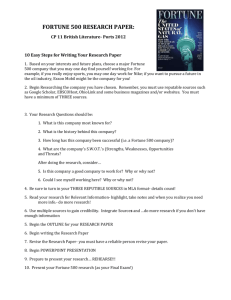


![[H1]The if Statement](http://s3.studylib.net/store/data/007457167_1-3dc720aa2ebb8f598f57fd2434e44ad0-300x300.png)
